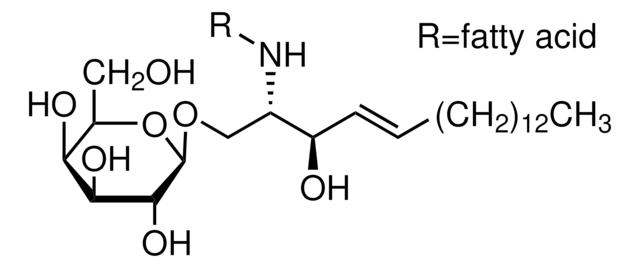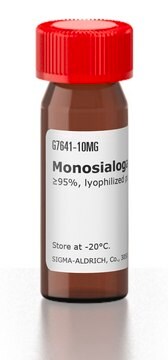S1006
Sulfatides from bovine brain
≥97% (TLC), powder
Synonym(s):
Cerebroside sulfate
Sign Into View Organizational & Contract Pricing
All Photos(2)
About This Item
UNSPSC Code:
12352200
NACRES:
NA.77
Recommended Products
General description
Sulfatideis a glycospingolipid and plays an essential role in host-pathogen recognition,β-cell function, infection, haemostasis/thrombosis, protein trafficking, cellgrowth, cell adhesion, neuronal plasticity, cell morphogenesis, and signaltransduction. It is found on the surface of the blood cells such asplatelets, leukocytes, and erythrocytes. Sulfatides are also found in the serumas glycosphingolipids in lipoproteins. It is made up of glycan part, a hydrophobic part, 3-O-sulfated galactose, and ceramide, which in turn is composed of a sphingosine base and a fatty acid. It is an important component forthe maintenance of the myelin sheath andproper formation of the axo-glial junctions. Variations in the production ofsulfatides are associated with various human diseases like cancer andimmunological disorders. Alterations in the sulfatide metabolism lead to synapticdysfunction, neurological decline, inflammation, and myelin deterioration.
Sulfatide is a 3-O-sulfogalactosylceramide consisting primarily of galacto cerebroside sulfate. It is localized in myelin sheath and comprises approximately 4% of total myelin lipid in brain.
Application
Sulfatides has been used in:
- enzyme linked immunosorbent assay (ELISA) in human plasma samples
- thin layer chromatography in myelin membranes
- in sulfatide binding assay of properdin
Biochem/physiol Actions
Sulfatides play a key role in physiological processes of nervous system, immune system and in insulin secretion. Anomalies in sulfatides catabolism in lysosome is implicated in late infantile metachromatic leukodystrophy. High levels of sulfatides is also observed in ovarian cancer. Sulfatides contribute to the pathogenesis of chronic inflammatory diseases of the central nervous system.
Storage Class Code
11 - Combustible Solids
WGK
WGK 3
Flash Point(F)
Not applicable
Flash Point(C)
Not applicable
Personal Protective Equipment
dust mask type N95 (US), Eyeshields, Gloves
Certificates of Analysis (COA)
Search for Certificates of Analysis (COA) by entering the products Lot/Batch Number. Lot and Batch Numbers can be found on a product’s label following the words ‘Lot’ or ‘Batch’.
Already Own This Product?
Find documentation for the products that you have recently purchased in the Document Library.
Customers Also Viewed
Elevation of sulfatides in ovarian cancer: an integrated transcriptomic and lipidomic analysis including tissue-imaging mass spectrometry
Liu Y, et al.
Molecular Cancer, 9(1), 186-186 (2010)
Natalia A Crivello et al.
The Journal of nutritional biochemistry, 21(11), 1083-1088 (2010-01-23)
Dysregulation of myelin sulfatides is a risk factor for cognitive decline with age. Vitamin K is present in high concentrations in the brain and has been implicated in the regulation of sulfatide metabolism. Our objective was to investigate the age-related
Sulfatide-binding assay for von Willebrand factor: detection of von Willebrand's disease without discrimination of vWD subtypes
Favaloro EJ
Thrombosis Research, 98(2), 213-219 (2000)
C Mazurier et al.
Bailliere's clinical haematology, 9(2), 229-241 (1996-06-01)
von Willebrand disease (vWD), the most common congenital bleeding disorder in man, is related to quantitative and/or qualitative abnormalities of von Willebrand factor (vWF), a protein necessary for platelet-vessel wall interactions and for carrying factor VIII. Distinct abnormalities of vWF
A recombinant two-module form of human properdin is an inhibitor of the complement alternative pathway
Kouser L, et al.
Molecular Immunology, 73(11), 76-87 (2016)
Related Content
Discover Bioactive Small Molecules for Lipid Signaling Research
Our team of scientists has experience in all areas of research including Life Science, Material Science, Chemical Synthesis, Chromatography, Analytical and many others.
Contact Technical Service









